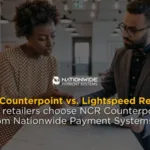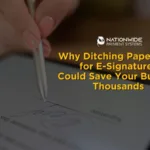Crypto, Hardware, and Fintech: What’s Hot and What’s Not
Welcome back to the B2B Vault, your source for trending topics that matter to small and midsize business owners. Last week we spanned the payments ecosystem, from hardware to virtual currencies and all the new developments in between.
How to choose a POS System:
When Dave and I started Nationwide Payments Systems in 2001, there were just a few POS systems. Today, we cover a range of options in our Jan. 27, 2022 podcast, “Point of Sale Systems Parade.”
If you’re in the market for POS, know how much you want to spend. Server-based systems are more expensive but have more features. Some iOS and Android solutions offer little in the way of service and support.
Integrations: Will you need to integrate bar software or accounting, payroll, or inventory management software into your system? Depending on your business’s size and requirements, there are all kinds of options.
Functionality: What do you need your POS system to do? Will you need to pay at the table? Will guests check out at the counter? Will you need printers in the kitchen, and if so, how many? How many touchscreens will you need, and where will they be placed?
Connectivity: Make sure your facility is wired and has access ports and cabling for your POS system at all installed locations. If you’re going to use WiFi, I recommend installing separate, secure WiFi for your staff and a different, public WiFi for guests to use.
Security: Your POS system and your POS service provider must be PCI compliant. Payment card brands have a list of service providers that meet all current Payment Card Industry Data Security Standard (PCI DSS) requirements. Consider installing separate routers for your public network and your business network.
Clover: Clover is a popular choice for small merchants, but few tap its full potential. When I see a Clover system at a retail or restaurant location, I ask if they put their inventory, menu items, and marketing programs on Clover. They usually say, no, we use it for payments. Clover is the most expensive credit card machine I’ve ever seen on someone’s counter in those cases.
iPad Systems: iPad POS systems at bars, restaurants, bubble, tea, coffee shops have backend programs that support different rules and taxes. Tax on cigars is additional than restaurant tax. Franchise mode enables franchise owners to keep track of sales at all locations.
Specialty Solutions: We deploy POS systems for sports stadiums, pizza delivery, and QSRs, including configuring, installing, and advising on wiring. Our iPad solution is not WiFi dependent and communicates locally with physical stations. Our vertically-focused solutions for specialty retailers, like salons or liquor stores, run on iOS or Android. We help gas stations upgrade their pumps to accept chip cards and become EMV compliant. Get in touch with us at Nationwide Payment Systems to explore more options.
How to accept cryptocurrency:
Crypto dominates the headlines after quietly gaining traction for years behind the scenes. Nationwide Payment Systems got into crypto early and figured out how to make it work in the small business community.
If you’re concerned about price volatility, or intermediary processing fees, here’s some good news. Advanced cryptocurrency solutions have eliminated risks and unknowns. These advancements have made cryptocurrency acceptance simple, profitable, and fun. Here are ten reasons for offering cryptocurrency as an additional payment option to your customers, suppliers, and partners.
1. A safe way to do business overseas
Cryptocurrencies are less expensive than wire transfers but just as direct and secure. Why charge costly foreign transaction fees of 1 to 3 percent? Upcharge at your discretion or charge a small transaction fee to secure cryptocurrency transactions and keep customers returning.
2. Cost-effective commerce
These days consumers expect to check out in their preferred ways, and a growing number are choosing cryptocurrency. Best-in-class cryptocurrency platforms have no set-up fees, monthly fees, or chargebacks, making crypto a cost-effective alternative to traditional payments.
3. Eliminate pricing volatility
Guaranteed price protection eliminates volatility and liquidity risks related to cryptocurrency. Choose a licensed money service business provider that locks in the best exchange rates at the point of sale. Sell an item for $50 and receive $50 less a small transaction fee with guaranteed pricing and charge additional fees at your discretion.
4. Get paid in USD
When your customers pay with their chosen eWallets, your chosen provider will automatically convert their payments to your local currency and send the funds directly to your bank account.
5. Easy integrations
Best-in-class cryptocurrency platforms facilitate seamless, omnichannel commerce with API libraries that simplify shopping carts, iOS and Android, and other system integrations.
6. Easy-to-use portal
Your cryptocurrency platform’s transactional hub will display Bitcoin, Bitcoin Cash, XRP, Litecoin, Ethereum sales, refunds, and daily transactions. Send invoices and receive money in your bank, like you batch out your merchant account.
7. Safe outlet for crypto holdings
Explore cryptocurrency and securely invest, store and transact within a stable infrastructure.
8. ID theft protection
Cryptocurrency technology’s built-in security includes Know Your Customer, Anti Money Laundering, and ID verification protects and secures transactions.
9. Accept multiple payment methods
Use available technology platforms to integrate cryptocurrency into your payment options seamlessly. Accept multiple cryptocurrencies and enable your customers to check out in their preferred ways.
10. Unlock new revenue streams
Accept cryptocurrency payments online, in stores, and via invoices and unlock untapped revenue with ongoing technical support.
With the Nationwide Payment Systems crypto, acceptance solution users can use ANY wallet, unlike others that require transferring cryptocurrency to another wallet. There’s no need to learn how to buy, sell, or trade cryptocurrency. We do it all for you.
Expanding B2B Payment Options
I think we can all agree it’s getting easier for businesses to transact online. The B2B vertical has been growing, primarily driven by the pandemic when people were not in their offices and had to transact on payment portals. Here are some fast, efficient, easy B2B payment options:
Payment portals: Payment portals support payments by credit card, ACH, or eCheck. You can use payment portals to send invoices to your customers with links that help payments 24/7. Portals are fast, efficient, and easy to use.
Checks: Nacha, the National Automated Clearing House Association, logged 7.5 billion in eCheck transactions in the fourth quarter of 2021, 6.1 percent higher than the same period in 2020. Electronic check usage is steadily growing, year-over-year, and payment portal usage, as paper check usage declines.
Credit card processing: Credit card usage simplifies payments in the B2B world. I would hand over their credit card as a business owner instead of waiting to get paid because 30 days turn into 60 days. Sixty days turn into 90 days. Ninety days turn into 120 days. It’s better to take a credit card and pay a small fee than to wait that long for your money.
ACH payments: If you offer your customers free ACH payments, they are less expensive than credit card processing, and you could get paid faster. The whole idea is to get paid more quickly deposit money in your bank account.
P2P apps: Peer-to-peer (P2P) payments are popping up, but if you’re a business, you’ll need to keep a careful record of any transactions on PayPal, Venmo, Zelle, or Cash App, no matter how small. The new IRS $600 rule requires business owners to switch over to a business account, so you’re not using a personal account for business transactions, and you’ll also get a 1099 form from Zelle.









